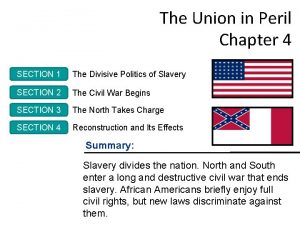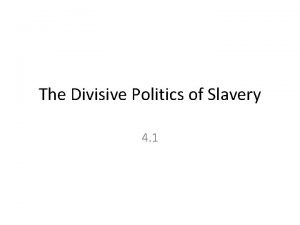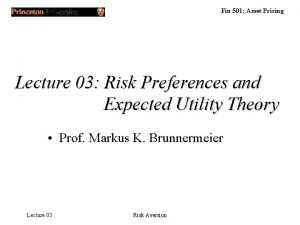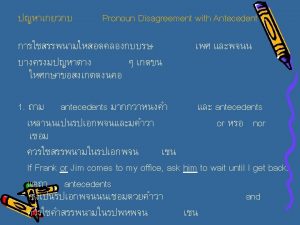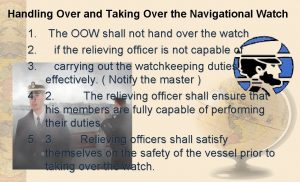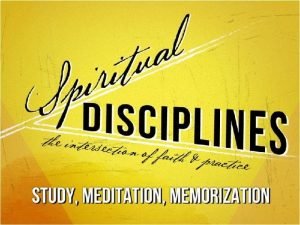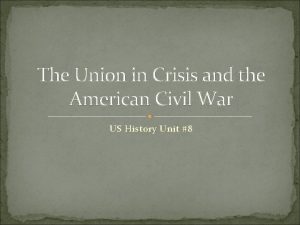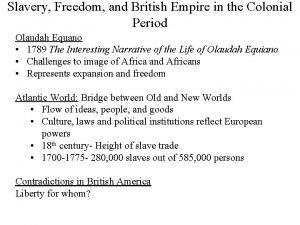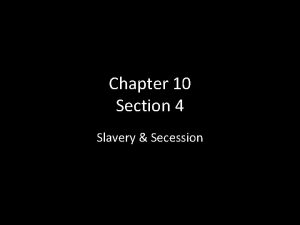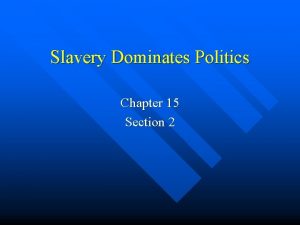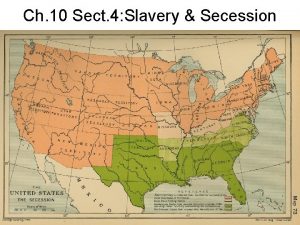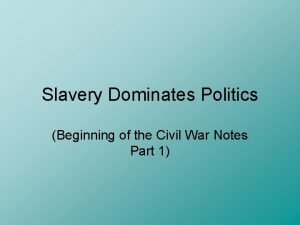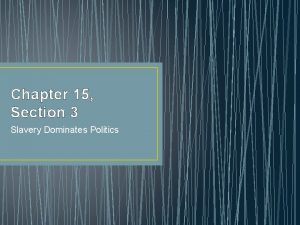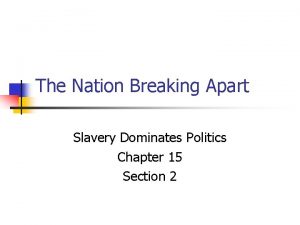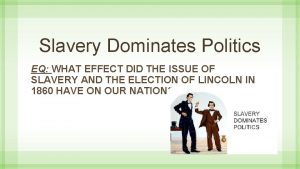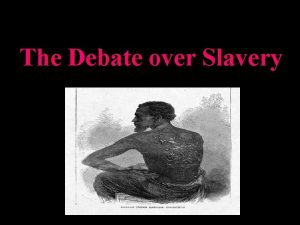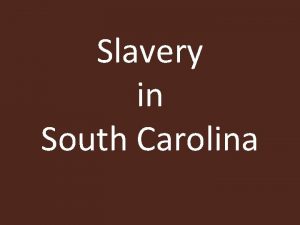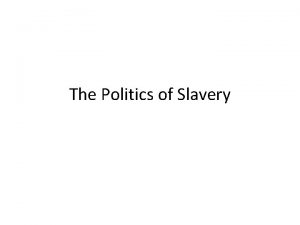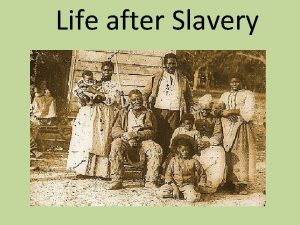15 3 Slavery Dominates Politics Disagreement over slavery















- Slides: 15

15. 3 Slavery Dominates Politics • Disagreement over slavery led to the formation of the Republican Party and heightened sectional tensions.

The Republican Party • Antislavery politicians from various parties met to form a new party “to concentrate the popular sentiment of this state against the aggression of the slave power. ” • In memory of Thomas Jefferson, they called themselves Republicans.

Dred Scott Case, 1856 • Stated Scott was not a citizen & could not sue in U. S. courts as a result • Declared that African Americans were not U. S. citizens • Congress could not ban slavery in the territories – Would violate slaveholders’ 5 th Amendment rights

Lincoln – Douglas Debates • Both running for Illinois Senator • Main topic: Expansion of slavery • Lincoln: Slavery should be contained • Douglas: Gov. stay out of issue / popular sovereignty • Victor: Douglas https: //www. youtube. com/watch? v=db. Ckg. KQhxr. Q

A VOICE FROM THE PAST “A house divided against itself cannot stand. ” I believe this government cannot endure, permanently half slave and half free. I do not expect the Union to be dissolved—I do not expect the house to fall—but I do expect it will cease to be divided. It will become all one thing, or all the other. Abraham Lincoln, Springfield, Illinois, June 16, 1858

John Brown Attacks Harper’s Ferry • Wanted slaves to fight for freedom • Oct. 16, 1859: Brown & 18 followers captured the arsenal at Harpers Ferry – Killed 4 people in the raid • Brown wanted slaves to take up arms and fight – No one joined • Brown and six of his men were captured by U. S. Marines – Brown was tried for murder & treason

15: 4 Lincoln’s Election and Southern Secession

Election of 1860 • Candidates: Douglas, Lincoln, John Breckenridge (V. P. ), John Ball (Const. Union Party) • Turned into two races – one in the North, one in the South

Election of 1860 • Lincoln & Douglas had Northern power • Breckenridge & Bell held Southern power • Slavery: – Lincoln: contained – B-Ridge: Fed. Gov. protect slavery in the territories • Lincoln won

Despite Lincoln’s statements that he would do nothing to abolish slavery in the South, white Southerners did not trust him. Southerners saw the Republican victory as a threat to the Southern way of life. Lincoln Douglas Bell Breckenridge

Southern States Secede • South threatened to secede if Lincoln was elected • Dec. 20, 1860: S. C. became the first state to secede • Next 6 weeks, 6 more left – MS, FL, AL, GA, LA, TX

Southern States Secede • Feb. 1861, states that seceded formed the Confederate States of America • Jefferson Davis, President of the Confederacy

Abraham Lincoln’s Inaugural Address On March 4, Lincoln took the oath of office and gave his First Inaugural Address. He assured the South that he had no intention of abolishing slavery there. He spoke forcefully against secession, and ended his speech with an appeal to friendship: A VOICE FROM THE PAST We are not enemies, but friends. We must not be enemies. Though passion may have strained, it must not break our bonds of affection. The mystic chords of memory, stretching from every battle-field and patriot grave, to every living heart and hearthstone, all over this broad land, will yet swell the chorus of the Union, when again touched, as surely they will be, by the better angels of our nature.

• Lincoln would not press the South • Wanted no invasion, but he would not abandon the government’s property there. Several forts in the South, including Fort Sumter in South Carolina, were still in Union hands. These forts would soon need to be resupplied. • Throughout March and into April, Northerners and Southerners waited anxiously to see what would happen next.

Test next class on chapters 1315!
 Chapter 4 section 1 the divisive politics of slavery
Chapter 4 section 1 the divisive politics of slavery The divisive politics of slavery
The divisive politics of slavery First order stochastically dominates
First order stochastically dominates First order stochastically dominates
First order stochastically dominates First order stochastically dominates
First order stochastically dominates Whatsa pronoun
Whatsa pronoun Pronoun disagreement
Pronoun disagreement Explain how to handing over and taking over the watch
Explain how to handing over and taking over the watch Over the mountain over the plains
Over the mountain over the plains Siach reciting the word over and over
Siach reciting the word over and over How did bleeding kansas embody the slavery controversy
How did bleeding kansas embody the slavery controversy Triangular trade routes apush
Triangular trade routes apush Slavery
Slavery Slavery grievance (modified) answer key chart
Slavery grievance (modified) answer key chart Chapter 11 cotton slavery and the old south
Chapter 11 cotton slavery and the old south Chapter 10 section 4 guided reading slavery and secession
Chapter 10 section 4 guided reading slavery and secession
